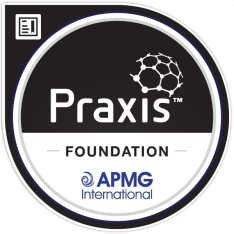Praxis Framework™ Foundation Outline
Module 1: Introduction to Praxis
- Value of ‘Free’
- Discontinuous Mind
- Praxis Context
- Goals of P3 Management
- Central Elements of Both Project and Programme Management
- Typical Characteristics of Programme Management
- Core Elements of Portfolio Management
- Commonly Identified Areas of Complexity for Projects and Programmes
- Time to Drop Quality
- Expansion of the Triple Constraint within the Praxis Method
Module 2: Life Cycle Management
- Goals of Life Cycle Management
- P3 Life Cycle Phases and Governance Mechanisms
- Typical Serial Project Life Cycle
- Parallel Project Life Cycle
- Parallel Project Iteration
- Typical Programme Life Cycle
- Typical Portfolio Life Cycle
Module 3: Agile Project
- Characteristics of an Agile Project and its Relationship with the Triple Constraint
- Scrum Development Process Used in Agile Projects
- Praxis and DSDM Agile
- Goals of Sponsorship
- Characteristics of a Sponsor
Module 4: Knowledge and Maturity Management
- Goals of Knowledge Management
- Establishing Knowledge Management
- Goals of Capability and Maturity Management
- CMMI Capability and Maturity Levels
- Praxis and Other P3 Guidance
- Praxis Delivery Functions
Module 5: Integrative and Organisation Management
- Integrative Management Functions
- Principles, Goals, and Procedures of Organisation Management
- Organisation Management – Levels
- Standard Project Structure
- Programme Structure
- Organisation Management Plan
Module 6: Stakeholder Management
- Principles, Goals, and Procedures of Stakeholder Management
- Stakeholder Map
- Stakeholder Management Plan
- Stakeholder Register
- Principles and Goals of Business Case Management
- Business Case
- Justification
Module 7: Planning
- Principles and Goals of Planning
- Management Plans
- Delivery Plans
- Inherent Uncertainty
- Typical Sections of a Delivery Plan
- Principles and Goals of Control
- Categories of Control Techniques
- RAG Reports
- Control Management Plan
Module 8: Assurance
- Principles and Goals of Assurance
- Assurance
- Assurance Management Plan
- Principles, Goals, and Procedures for Information Management
- Information Management Plan
Module 9: Scope Management Plan
- Principles and Goals of Scope Management
- Scope Management Procedure
- Terminology of Scope
- Product Documents
- Product Definition Techniques
- Scope Management Plan
Module 10: Requirements Management
- Principles, Goals, and Procedures of Requirements Management
- Characteristics of a Well Specified Requirement
- Purpose of Value Management
- Requirements Management in Project and Programmes
- Principles, Goals, and Procedures of Solutions Development
Module 11: Benefits, Configuration, Schedule Management
- Principles, Goals, and Procedures of Benefits Management
- Benefits Management Plan
- Principles, Goals, and Procedures of Change Control
- Principles, Goals, and Procedures of Configuration Management
- Principles, Goals, and Procedures of Schedule Management
- Time Scheduling
Module 12: Techniques and Charts
- Factors Affecting the Choice of Technique
- Time Scheduling Techniques
- Gantt Chart
- Network Diagram – Precedence Diagram
- Critical Path Analysis
- Forward Pass
- Backward Pass
- Float Calculations
- Types of Floats
Module 13: Scheduling
- Resource Scheduling
- Resource Limited Scheduling
- Options for Manipulating Activities
- Options for Manipulating Resources
- Estimating Techniques
- Schedule Management Plan
- Principles, Goals, and Procedures of Finance Management
- Principles, Goals, and Procedures of Investment Appraisal
- Factors to be Included
Module 14: Investment, Budget, and Funds
- Investment Appraisal Techniques
- Scoring Methods
- Payback Method
- Discounted Cash Flow
- Principles, Goals, and Procedures of Funding
- Principles, Goals, and Procedures of Budgeting and Cost Control
- Base Cost
- Major Components of a P3 Budget
- Types of Costs to be Tracked
- Finance Management Plan
Module 15: Risk Management
- Principles, Goals, and Procedures of Risk Management
- Risk Context
- Risk Assessment Techniques
- Probability-Impact Assessment
- Risk Responses
- Risk Management Plan
- Risk Register
Module 16: Change, Contract, and Resource Management
- Principles, Goals, and Procedures of Change Management
- Change Management Models
- Principles, Goals, and Procedures of Resource Management
- Principles, Goals, and Procedures of Procurement
- Principles, Goals, and Procedures of Contract Management
- Universal Principles Governing Contracts
- Typical Contract Information and ‘Conditions’
- Principles, Goals, and Procedures of Mobilisation
- Resource Management Plan
Module 17: Project and Programme Processes
- Identification Process
- Appoint Identification Team
- Review Previous Lessons
- Prepare Brief
- Prepare a Definition Plan
Module 18: Sponsorship Process
- Review Request for Authorisation
- Provide Management Support
- Confirm Closure
- Definition Process
- Appoint Definition Team
- Pre-authorisation Work
Module 19: Plan Delivery
- Consolidate Definition Documentation
- Delivery Process
- Authorise Work
- Progress Report
- Event Report
- Update and Communicate
- Accept Completed Work
Module 20: Boundaries and Closure Process
- Close and Review the Previous Tranche/Stage
- Assemble Documentation
- Development Process
- Accept Work Package
- Context of the Development Process
- Closure Process
- Prepare for Closure
- Benefits Realisation Process
- Prepare for Transition
- Conclude Transition
Module 21: Interpersonal Skills and Conflict Management
- Goals of Communication
- David Berlo’s Components of Communication
- Goals of Conflict Management
- Thamhain and Wilemon - Sources of Conflict
- Tuckman
- Conflict Management Models Maccoby and Scudder
- Conflict Management Models Thomas-Kilmann
- Goals and Procedure of Delegation
- SMART Objectives
- MoSCoW Prioritisation
Module 22: Leadership
- Goals of Leadership
- Hersey and Blanchard
- Adair’s Action-Centred Leader
- Maslow’s Hierarchy of Needs
- In P3 Management Terms
- Hertzberg
Module 23: Influencing
- Goals of Influencing
- Cialdini’s Six Principles of Influence
- Cohen and Bradford Influence Model
- Ethics
- Montana and Charnov’s Seven Forms of Power
Module 24: Negotiation
- Goals of Negotiation
- Typical Procedure of Negotiation
- Shell’s Five Styles of Negotiation
- Goals of Teamwork
- Belbin Team Roles
- Katzenbach and Smith’s Level of Teamwork






































 Back to course information
Back to course information




 If you wish to make any changes to your course, please
If you wish to make any changes to your course, please

